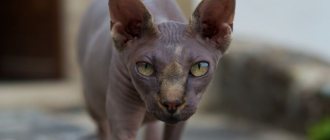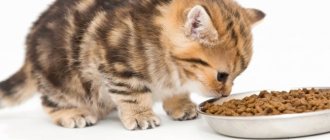Siamese cats often suffer from viral infections and metabolic disorders, which significantly affects their life expectancy. However, with proper care, representatives of this breed are able to cross the twenty-year mark.
Let's find out how long Siamese live, what other factors affect their health and how to delay the aging process of your beloved pet.
Keeping a Siamese cat at home
Siamese cats are not only strong, but also smart, so by adhering to a number of rules, you can get rid of unnecessary hassle.
Rules of care and hygiene
The peculiarity of the coat of Siamese cats is that it has no undercoat, while the hair is short and smooth. Removing falling hairs is quite simple; just run a damp hand through the fur.
Even if this is not done, the animal copes with this problem on its own without much effort. Water procedures are not mandatory for domestic cats, but show-class cats will have to be bathed, especially when the cat returns home from the street. In any case, a bath will also be required for those individuals who often walk outside.
It is imperative to monitor the condition of your ears, occasionally wiping them with cotton pads. They can simply be soaked in warm but boiled water. The same discs are used to wipe the eyes if discharge is noticed in their corners.
What to feed
The most suitable option is to use ready-made factory feeds for feeding, giving preference to those labeled “holistic” and “super-premium”. The most acceptable foods are “Acana”, “Applaws” and “Orijen”, since these products have balanced compositions, which has been confirmed over several years.
Experts recommend feeding your pets one type of food: either natural or dry ingredients. As for the breeders, they take a different position. They believe that it is more optimal and beneficial to use both types of feed interspersed.
A Siamese cat's diet should include some basic foods, such as:
- Boiled chicken breast.
- Raw beef.
- Meat-based baby food.
- Dairy products.
It is not recommended to give pork to your domestic cat, as well as milk, which promotes diarrhea due to the fact that the cat's body does not digest lactose.
Diseases, breed defects
This breed of cat has very beautiful eyes, but they often have to pay for this beauty with breed anomalies. One gene is responsible for the color and shape of the eyes, which can also cause not only strabismus, but also vision problems in general.
There is another hereditary problem associated with the presence of knots, hooks, and kinks in the tail.
These cats, especially at a young age, suffer from respiratory problems. Cats are often diagnosed with calcivirosis, an upper respiratory tract disease.
Once born, kittens may suffer from impaired coordination of movements. This disease can be identified by the head falling to the side. In fact, this is a genetic defect and is associated with problems in the inner ear associated with the functioning of the vestibular apparatus.
Siamese cats, subject to psychological discomfort, will lick themselves until bald spots appear. Therefore, they are prone to diseases associated with psychological discomfort, that is, on a nervous basis.
There are some other ailments that are associated with this breed, such as:
- Manifestation of asthma.
- Achalasia of the esophagus, which is associated with difficulty in getting food.
- Oncology of the small intestine (adenocarcinoma).
- Hyperesthesia is increased sensitivity.
- Lung oncology.
Siamese cats can also experience allergic reactions to certain types of food, cigarette smoke, various aerosols, flea bites and even increased concentrations of dust.
Nutrition
Rational feeding is an important point to ensure a happy life for a pet. Every living creature needs proteins, fats and carbohydrates. In the first weeks, proteins are of greatest value, as the most important building material.
Over the years, the need for proteins gradually decreases. An older animal will need a gentle diet. These should be foods that are easy to digest.
There are several feeding options:
- ready-made food,
- natural food,
- mixed.
At an early age, natural products . These are meat, vegetables and cereals, with the obligatory addition of vitamin complexes. The most important supplement for Siamese babies is often cottage cheese and milk porridge. These are important sources of calcium for the body, which quickly gains weight. Meat and offal must be of high quality and low-fat varieties. It is not advisable to feed your mustachioed ward pork and pork by-products, as they contain an excessive amount of fat.
Store-bought food is convenient because it does not need to be prepared. You just need to open a new package. They contain all the essential minerals and vitamins, so no additional nutritional supplements are required. Dry granules can be left in a bowl all day - it will not spoil. Canned food, on the contrary, should not be stored in the fresh air for more than two to three hours. They are more expensive than dry ones, but do not have their disadvantages: when eating a dry product, the wards must drink a lot. This is important for complete digestion of dried granules.
Mixed feeding is not recommended by veterinarians, as it will cause an excess of certain vitamins. Industrial feeds have a balanced composition, which the wards need depending on the number of years they have lived. The addition of natural substances leads to an excess of nutrients in the body, for example, cottage cheese - to excess calcium, liver - fat-soluble vitamins.
This is interesting: Photo of a Siamese longhaired cat
Breed Features
The homeland of Siamese cats is Thailand, which several centuries ago was called “Siam”. These graceful pets were first brought to England. A cat of the named breed has ears, tail, paws, and face that are darker in color than other parts of the body. The lifespan of Siamese cats depends on many factors.
It is noteworthy that at birth the kitten is completely white and only over time acquires dark spots. It is also interesting that in Siamese cats, strabismus was previously considered normal.
, and now it’s a serious defect. This also applies to the crease in the tail.
It is difficult to establish the average lifespan of a four-toed house dweller.
With good treatment and care, a Siamese cat lives a very long time, more than 10, and if you're lucky, even more than 20 years.
Representatives of the British breed can live the same amount of time. It happens that an animal dies 2-3 years after birth, it all depends on the lifestyle, health and atmosphere in which it lives.
The life expectancy of a Siamese cat is affected by:
- heredity. Long or short life is directly related to the genetic characteristics of the genus;
- care. Good food, hygienic care and love from the owner/mistress will give the pet longevity;
- quality treatment. Regular disease prevention and timely medical care.
One of the most important aspects of a cat's longevity is good health. Pure breeds are more prone to a variety of diseases than mixed breeds. Pets can suffer from a variety of diseases, including urolithiasis, kidney disease and eye disease. All of these diseases affect the life of a pet.
It is almost impossible to give a clear answer to the question “how many years do Siamese cats live?” We can only say that on average, Siamese cats live longer than males. The most important thing is that the pet is always in good condition
To do this, you need to undergo regular examinations at a veterinary clinic, create a daily menu, regular walks in the fresh air, receive attention and sincere love
Siamese cats live an average of 20 years if he is forced to move more often and given more attention. Even in old age, an animal should not be left to chance and allowed to sleep all day long. We need to create a motivating environment for them so that they themselves want to run around the house and play. At home, Siamese cats live a very long time if there is care and sincere love around them.
If a new resident has appeared in your house, then you will immediately have a number of questions. How long do Siamese cats live at home, and what is the best way to prolong their life?
In the video above, the 20-year-old
Siamese cat!
Care
The lifespan of a cat will be largely influenced by care and nutrition. The main activities depend on where the newly arrived family member comes from. If you purchased it from a responsible breeder, then everything is much simpler. As a rule, kittens are sold only at 2.5-3 months. At this time, they are able to feed themselves, they do not depend on their mother and will endure separation from her almost painlessly. By 3 months they receive their first vaccinations: usually this is a complex vaccine against several microbes at once.
To read: Features of the Japanese Mastiff breed, care and cost of the dog
In the future, revaccination is required every year - it is necessary to strengthen immunity. If for some reason the vaccine is not administered on time, then repeated injections are given. Only double vaccination can create strong immunity against infections.
The Siamese breed is characterized by good health. They are little susceptible to pathologies of internal organs. Therefore, the only thing your pet needs is an annual examination by a veterinarian with blood and urine tests. These studies will help identify possible diseases at an early asymptomatic stage.
Siamese, as representatives of the East, grow up quickly. early sterilization is applied to them . During estrus, both males and females behave excessively active, meowing loudly and protractedly. Already at 6-7 months they are operated on, because the best results can only be achieved with sterilization before the first heat.
Rules that will help prolong the life of your pet
- proper nutrition (calorie-balanced and age-appropriate);
- physical exercise;
- timely vaccination against various diseases;
- prevention against all kinds of disorders;
- castration or sterilization of the animal (of course, at the request of the owner);
- routine examinations and examinations by a veterinarian.
How long your pet will live will depend only on you. Give him your care, warmth and love, rejoice in his successes, and he will certainly be happy! Health and longevity to your pet! I hope I was able to answer the question of how many years cats live at home.
At what age is surgery performed?
Experts recommend sterilization and castration after the kittens' genital organs are fully formed. This happens starting from the age of six months. An operation performed earlier slows down the growth of the animal and provokes diseases of the genitourinary organs due to underdevelopment of the urethra.
There are many advantages to the operation, but some owners believe that it is inhumane and will negatively affect the condition of the pet.
The optimal age for surgery on a kitten is 7-9 months. The cat will mature, but will not have time to gain sexual experience. Although there are no restrictions on castration, it can be done at any older age if there are no contraindications to its implementation.
How many years do cats live?
Let's try to figure it out.
Our furry friends typically live between twelve and fifteen years. But among them there are also long-livers, capable of staying in the family for all of twenty, or even twenty-five! It all depends on the owner and the conditions under which the pet is kept.
Some scientists believe that the lifespan of pets is affected by their sterilization. Sexual aggression after castration is reduced, as well as the load on the body associated with the process of procreation. This operation, in particular, minimizes the possibility of various diseases of the uterus and mammary gland tumors in females. After castration, sexual arousal disappears in males, as well as all accompanying worries and stress.
To find out how many years cats live in indoor and outdoor conditions, you just need to convert their age to human age. There is an opinion that a cat's year of life is equivalent to seven human years in the first five years, and later - to five.
Thus, a six-month-old kitten’s development corresponds to a three-year-old child, and two years after birth it corresponds to a 14-year-old teenager. Cats at this age are similar to people in that they develop certain habits that practically do not change. Therefore, you need to start raising a cat as early as possible, preferably before one year.
With age, cats pacify their temper and become calmer. Nine years is already pre-retirement age for them, when compared with a person, and fifteen is very old.
How many years do Siamese cats live?
Some sources report that they usually live, like all others, from fifteen to twenty years, but there are also those that live up to twenty-eight years.
There are rumors that the Siamese cat Mavrodi, who became famous as the creator of the MMM project, lived with him for thirty years!
How to help a cat live longer?
A cat will not live long on the street. According to research by ecologists, their average life expectancy in outdoor conditions is usually only about five years.
Very often, stray kittens die. But when they gather in colonies or flocks, it is easier for them to survive. In Britain they even once registered a kind of record - nineteen years.
At the same time, their relatives living next to humans do not have to fight for their survival at all, so the lifespan of cats at home is much longer!
The oldest cats in the world
A cat named Cream Puff lived for thirty-eight years and three days, thereby entering the famous Guinness Book of Records as the longest-living one recorded for 2021. But last year she was overtaken by the kitty Lucy from Llanelli in the UK. A year ago she turned 39 years old, and she is still alive and well. A representative from the Guinness Book of Records confirmed that Lucy is now officially the oldest cat in the world.
So the answer to the question of how many years cats live depends directly on the owners: how much constant attention and care they provide. It’s better to just live next to your beloved pet, without thinking about the bad and enjoying every new day spent in harmony!
What will happen to the Thai cat after castration?
After a short recovery period, the cat returns to its usual rhythm of life. The hormonal levels are slowly beginning to stabilize, the testes no longer produce new hormones, the cat calms down, stops showing anxiety, marking and screaming.
Two weeks after castration, the unpleasant smell of cat urine from the litter box decreases, and soon stops altogether. The cat stops making marks, behavior changes for the better, aggression goes away. In general, castration of Thai and Siamese cats has many advantages:
- The cat will stop making marks on walls, things and furniture
- Will behave calmer, will not scream
- Aggression will go away, playfulness and activity will remain
- No risk of testicular cancer and prostatitis
- There will be no unpleasant smell of cat urine
- The cat will not run outside looking for a meeting with the cat
- Will live several years longer
- Will not get sexually transmitted infections
Castration is done only once in a lifetime, does not take much time at all and does not require any complex care, and the recovery period for Thai and Siamese cats takes only a few days.
Find out how long do Siamese cats live?
Siamese cats are graceful, sensual and loyal creatures with distinctive coloring, a high level of intelligence, consciousness and awareness. They are playful, and in the heat of excitement they can unknowingly cause trouble.
The Siamese do this not out of malice - they just forget themselves during the games. Owners who have managed to become owners of cats of this breed speak of their pets warmly and with a smile.
This is not surprising: Siamese are strikingly similar to a tireless battery of energy, with which there is never a dull moment.
These cats are always in the thick of things; They actively follow you and help as much as they can, always coming up with something funny and cute.
Siamese are similar to people in their behavior and manners.
When getting yourself such a cat, remember that you are getting yourself another family member, with personal needs and desires.
There is a widespread belief among people that Siamese pets are one of the most evil and aggressive. It is unknown who conducted this “research” and by what criteria. Just because an animal is very open, sincere and honest does not mean that it is angry, aggressive and uncontrollable.
The Siamese will make it clear to you that they do not want attention now, when the same Persians become reluctant and restrained in accepting affection. Cats of this breed are extremely honest and frank. They love freedom and will not allow anyone to limit it.
The article will tell you how many years domestic Siamese cats live and provide overview data on their health status, character, breed characteristics, development and physiology. Will give recommendations on how to properly care for Siamese.
The historical homeland of the breed is wild, hot Thailand.
How to cope with loneliness
Most representatives of the cat family take loneliness calmly. They happily sleep in a cozy corner, waiting for their owners to return.
But this does not apply to Siamese cats. Without owners, the animal quickly begins to get bored and even suffer. Running around the rooms, Siamese cats loudly call their owners and almost cry, thanks to their developed vocal cords. And if cats spend a lot of time alone, this can ruin their character - they will become withdrawn, aggressive and even angry. It’s definitely not worth bringing them to this state. If you live alone and spend a lot of time outside the home, leaving your pet alone, then it is better to get not a Siamese cat, but some other, calmer breed.
History of the origin of the Siamese cat breed
Unfortunately, there is no clear answer to the question of where the wonderful creatures considered to be the Siamese cat breed came to us from. One can only be content with numerous legends, one of which, for example, says that the Siamese cat was first seen on Noah’s ship and was born as a result of the mad passion of a lioness and a male monkey who was passionately in love with her.
As for the place of origin of the handsome man, then, according to most hypotheses, his homeland is still Siam - present-day Thailand. This, by the way, is where some confusion arises in the name of the breed: a Siamese cat is often called a Thai cat. This is not exactly the same thing, but the Thai breed is related to the Siamese, so it can be said that it is one of its varieties.
In ancient Siam, cats were revered as sacred animals, as they acted as guards of local temples, and also accompanied dead people to the unknown other world. In addition, the Thais were convinced that the cream color of the animal’s fur, characteristic of the Siamese cat, indicated a special favor of fate towards them. That is why cats lived exclusively in rich and noble houses and were called “wai-chi-an-maad”, which translated means “diamond of Siam”. And thanks to the sacred aura of the cats of that time, scientists dedicated entire works to them: for example, the “Treatise on Cats”, an ancient work stored in the National Library of Thailand, has survived to this day.
Until a certain time, it was prohibited to export Siamese cats outside the country under threat of death penalty. It was only in 1884 that the local king decided to transport a couple of Siamese to Europe as a gift. Since then, the “career” of the breed, which simply could not help but be liked, has gone up, and in 1892 a pilot standard for “seal point” was formed in Great Britain: this is the color of the Siamese cat that was recognized as “royal”. In America, the breed standard was introduced in 1906, and the Siamese cat was brought to Russia only in 1987 from Poland. The first owners of Siamese in our country were representatives of the intelligentsia of Moscow and, of course, the local bohemia.
Playfulness
This is another interesting feature of the breed. The Siamese cat loves to play. And not alone with a suitable ball or toy mouse, but with people. At least several times a week, try to devote a little time to let your pet run after a bow - even older and sedate cats at such moments seem to return to childhood and happily run after the rustling piece of paper.
If you can’t spend a lot of time with your pet, then get him a friend – preferably of the same breed. True, there is a possibility that they will play together both during the day and at night, causing a real chaos in the apartment. But in this case, you can rest assured that they will be happy.
What can be done to prolong the life of an animal?
Cats, like humans, develop various diseases as they age. The development of pathologies is provoked by poor nutrition, low physical activity, and poor ecology. Research into the aging process in animals has been carried out by many scientists. As a result, the approximate beginning of this period was established: 5-6 years.
The research was based on the fact that with the onset of aging, the amount of natural antioxidants in the body of cats decreases, and the immune system weakens. These processes cannot be stopped, but they can be significantly slowed down
To make your cat's old age happy, it is important to follow several recommendations:
Selection of high-quality food and regular intake of multivitamins. Neutered kitties must follow a diet; such animals are prone to obesity. Closely monitoring the pet's condition. You can't always tell from a cat where it hurts. It is necessary to detect any changes in the animal’s behavior and consult a doctor promptly.
The importance of vaccinations and preventive examinations has already been mentioned above. Physical activity
Their health and life expectancy directly depend on how active domestic Persians, Sphynxes, British, Siberian, Siamese, Scottish Folds and other breeds of furry pets are. Caring for your ears, teeth, and maintaining good hygiene. Regular antiparasitic treatment. Fleas are carriers of dangerous diseases, so insects must be gotten rid of immediately. Intestinal parasites can cause serious problems in a cat's body. Sterilization. If the animal is not intended for breeding, then it is better to undergo surgery. The attention, affection and care of a loving owner not only prolongs the pet’s life, but also makes it bright and joyful
If animals do not have congenital pathologies, then following these simple rules will allow them to live to 20 years or more.
Character and temperament
The temperament of these cats is ambiguous. They are reasonable and sweet, but at the same time willful and quick-tempered. Most of all, Siamese do not like it when their space is limited or prevented from achieving what they want.
Cats of this breed are resourceful and inventive, they are kind to humans and appreciate their attention and care, but they slowly and difficultly get used to changing environmental conditions. Siamese are more likely to be excellent companions and companions than pliable “soft toys”
Representatives of this breed are often susceptible to urinary tract diseases. The cardiovascular and respiratory systems are healthy, sometimes pathologies affect the reproductive organs.
There are no problems with the Siamese's coat if you bathe them promptly and brush them twice a week. It happens that the ears are affected by ear mites. The disease is called otodectosis.
Siamese are a graceful and graceful breed, so they should not be overfed - the backbone and skeletal muscles of the breed are physically unable to tolerate an obese animal.
Features of feeding and diet
Veterinarians recommend including dry food in the diet of Siamese cats. Unlike natural food, granules help eliminate plaque and prevent the development of tartar. The breed often suffers from gingivitis and periodontal disease, so additional care for the oral cavity will not be superfluous.
Among industrial foods there are lines designed specifically for Siamese. On the package you can find a table with guidelines for feeding a kitten or adult animal. All norms are calculated based on the weight and age of the cat. Additionally, a feeding cheat sheet is indicated, where dry food is combined with wet food (canned food or pouches).
Dry food is divided by age and breed. Medicinal feeds are produced separately and are recommended as dietary food for sick animals. When choosing food, check its class. Economy class products are made from low-quality raw materials. It is filled with “empty” calories and is fraught with health problems. Good food starts from premium.
When purchasing, people are often put off by the price tag and mistakenly believe that the best food is holistic. It is attractive due to its high protein content, but its excess is fraught with complications. If a cat has problems with the urinary system, then it needs a low-protein diet. Check with your veterinarian to see if holistic food can be given to your pet.
If you have enough free time to cook, you can try natural feeding. It includes:
- lean meat (turkey, rabbit, beef);
- offal (liver, tripe, heart);
- low-fat fermented milk products (cottage cheese, yogurt);
- a small amount of vegetables (carrots, cucumbers) and sprouted greens;
- cereals (rice, egg).
Meat and offal should make up 2/3 of the total diet. Twice a week they can be replaced with sea fish, but only after the approval of a veterinarian.
It's easiest with newborn kittens. The mother feeds them with breast milk for up to 2 months. As animals age, they develop lactose intolerance, so milk is removed from the diet. If there is a shortage of mother's milk or a large number of newborn kittens, they are transferred to artificial formula. Up to 1 month, babies are fed every 2 hours.
From 2-3 months, kittens are given their first complementary foods. It can include minced boiled beef and homemade cottage cheese, which is necessary for bone development. At this age, little Siamese are fed 6 times a day. From 4 months, the number of feedings is reduced to 4-5, and from 6 months – to 3. Until 1 year, meals are reduced to 2 times a day, and portion sizes are increased.
When old age comes
Around the age of 8-9 years, Siamese cats become less active. At this age they begin to get sick more often. Signs of aging Siamese cat:
- the coat loses its former luster and becomes sparse;
- the pet sleeps more often than plays;
- vision and hearing deteriorate;
- claws peel off;
- The character of the cat changes - some become irritable, others become calmer.
Older cats often suffer from chronic diseases, catch colds more often, and many animals have problems with the musculoskeletal system and internal organs.
With good care, the pet will live for another 5-7 years, but now you need to be more careful about its health. You should undergo a routine examination by a veterinarian more often than before - every 2-3 months.
The secret to the longevity of Siamese breeds
It is impossible to predict how long your cat will live. A responsible owner will always check the health of his pet with a veterinarian, give vitamins to his pet, and provide timely treatment. The secret of the long life of the Siamese is love and need for his family, that is, his owners. Cats can be as loyal as dogs
Love and attention, as they say, can save you from any illness. Of course, Siamese, like other cats, count on you very much, and in return for your warmth and care they will give you their devotion and boundless love
Long-lived Siamese cats
A Siamese cat named Scooter from the US state of Texas, who was born in 1986, lived for 30 years. This is a record holder among representatives of its breed. His owner believes that the secret of his longevity lies in high physical activity and proper nutrition.
According to the owner, Scooter loved chicken and was delighted with water treatments. Unfortunately, he passed away in May 2021.
For a cat to live long, you need to provide it with good care from an early age. It is important to maintain hygiene, organize proper nutrition, increase physical activity, and also protect your pet from stress.
When signs of aging appear, more attention needs to be paid to disease prevention. However, the most important thing is to show love to the cat.
Liked? Please rate the article!
You might be interested
How long do cats take to grow?
Mixed Siamese cat
Where is the cat breed confirmed?
What is the name of a Siamese cat?
Attitude towards other people, pets, children?
The Siamese are very open and sincere. They treat everyone condescendingly, majestically, demonstrating royal majesty in everything. They will not miss the opportunity to remind the owner of their origin. In the apartment, Siamese are real emperors, demanding a lot of territory for games and royal pastime.
Siamese rarely find a common language with other cats; they are very sensitive and jealous, and do not intend to share the love and affection of their owners with anyone else. With dogs, these cats find a language with fifty percent success.
They are jealous of their owners, but due to different weight categories and size discrepancies, they rarely enter into open confrontation.
Siamese are indifferent to rodents, birds, and other exotic animals. They do not see a competitor and a serious adversary in a creature that is much smaller in size.
The desire to attack a smaller target remains only at the level of instincts when they get too excited. By providing small pets with the proper level of safety, conflicts can be successfully and easily reduced to zero.
Siamese pets treat children politely and affectionately. They will lull babies with gentle purrs, and play with small children without letting out their claws.
Cats of this breed do not offend the small and weak; they live fairly.
Cats are wary of strangers in the house and guests; during a feast they will prefer to hide from prying eyes.
Pros and cons of the breed
Of course, before purchasing a kitten or adopting one from a shelter, you should carefully study the advantages and disadvantages of the breed. Otherwise, there is a risk of seriously regretting the decision to have such a pet in the future.
The advantages of the Siamese breed include:
- ease of care,
- good health,
- life expectancy,
- sharp mind,
- ability to get along with dogs.
Unfortunately, it is also not without its drawbacks. This category should include a peculiar character - not always simple and flexible enough. Cats often refuse to adapt to their environment - even to their owners, not to mention other pets. Alas, nothing can be done about it - blue blood flows in their veins and the favorites of Asian kings are not always ready to make concessions. It is also not advisable to leave them alone for a long time.
Factors affecting lifespan
There are various situations: some owners have pets that live long and happy lives, while others, on the contrary, often get sick and die quite quickly. It is worth dwelling in more detail on the factors that influence the life expectancy of an animal. If we consider them in detail, it will be possible to prevent them. So, there are several main factors that influence a cat's lifespan.
Genetic predisposition. A certain breed of cat is prone to certain diseases, so you should be attentive to those systems that suffer the most. For example, the weak point of Persian cats is their kidneys; they often suffer from kidney failure. For this reason, Persians live no more than 10 years.
Accommodations. Cats at home live better than their relatives on the street. Pets eat well, are less likely to suffer from bacterial and viral diseases, and are protected from various infections, which cannot be said about street cats.
Food. Diet largely affects the lifespan of cats, but we should not forget about the balance of food. A lack of both vitamins and minerals can negatively affect a cat’s well-being, and sometimes even lead to irreversible changes in the animal’s body. You should consult with a specialist before choosing food.
It is worth understanding that some doctors prefer industrial food (dry and wet), while others emphasize the importance of natural food.
Sterilization. This factor can be viewed from two different angles
Thus, some doctors are confident that sterilization has a beneficial effect on the life expectancy of an animal, since after it the pet becomes protected from diseases of the reproductive system. Typically, cats live a little longer after sterilization. On average, this figure is up to 20 years. But cats that give birth regularly, on the contrary, harm their bodies and live less than usual. Other doctors, on the contrary, are confident that sterilization has a negative impact on cats, as it leads to inactivity and indifference. As a result, cats often suffer from obesity and diabetes, which leads to a short life.
Tendency to chronic diseases. Typically, pets with chronic diseases or diseases that are inherited do not live long. For example, animals with diabetes can live about 4 years, but the presence of urolithiasis predicts only 5 years of life.
Stress. Only pets surrounded by love become long-lived. A positive psychological climate has a great effect on the condition of the animal, which adds several more years to life. Stress has a detrimental effect on a cat's condition.
Confinement of space and cramped conditions. Of course, felines live better at home than outdoors. But in this case, it happens that they do not have enough space for an active life - for running, playing and jumping. A cat is primarily a predator that has fairly developed instincts. You should not buy a kitten if you live in a small apartment or if your home does not have enough space for active activities.
What can affect the health of a Siamese?
General health is undoubtedly the main factor in the longevity of any animal. Pedigree cats are usually more prone to diseases and disorders than mixed-breed or mongrel cats. Accordingly, such pets require additional, more careful care. Asian cat breeds are often susceptible to diseases such as:
- glaucoma;
- labored breathing;
- cholelithiasis;
- strabismus;
- renal failure.
How long do cats live after sterilization?
Sterilization is a surgical operation that can prolong the life of a pet by 3-6 years, according to average data. When the ovaries and uterus are removed, the animal becomes more affectionate and kinder, aggressiveness and temper disappear.
On a physiological level, a decrease in stressful situations for the body is revealed, due to the absence of the stage of excitation of the sexual cycle - estrus.
It is mandatory to sterilize animals that are unsuitable for reproduction! This is good for their health, increases life expectancy, and helps reduce the number of homeless animals.
Our Masha lived 19 years! And until recently she was a very active cat. I know this is very rare. Yes, we really took very good care of her.
And my girl is already 20 years old, we are active, full of energy and have no plans to die, and all this with a normal diet, without special care, although she was sterilized at the age of 7 years!
Factors in cat longevity
This animal is believed to have 9 lives. This opinion was formed on the basis that a cat falling from the 5th floor will not break. An animal that has been involved in an accident may also remain alive. How long do cats live? One year of her life is equivalent to 7 years of human life. On average, cats live up to 20 years. Although they
, if you care for them correctly and regularly.
Factors that influence a cat's lifespan include:
- living conditions of the animal,
- proper and balanced nutrition,
- cat breed,
- genetic predisposition to certain diseases,
- presence of stressful situations.
Living conditions
Life expectancy is primarily influenced by the habitat. Animals that live in an apartment and rarely go outside can live much longer than their street counterparts. The short life of barn cats is due to factors such as:
- dog attack;
- car accident;
- infection with various infections from other animals;
- poor nutrition, poisoning;
- human threat.
On average, barn cats live 5-8 years.
Domestic cats live up to 20 years. The main factor in their longevity is favorable living conditions, proper care and concern from their owners, as well as the lack of the lifestyle that street cats lead. Pets live stress-free lives because they are confident that they will not be poisoned, will not be attacked, and that they are completely safe at home.
Cats feel very well how they are treated, so you need to love her and create comfortable living conditions for her.
Cats need to be fed a proper and balanced diet. You should not feed animals only with special food; you must give them regular food. The food will be different from the food the pet owner eats. For a pet to live a full life, you need to know certain nutritional rules.
It is known that cheap dry food is addictive and provokes the development of various diseases. Milk can cause stomach upset in cats, since the cat's adult body is not able to process the lactose contained in milk. Only kittens can be fed milk. If the animal does not want to eat dairy products, then you should not insist on it.
The meat should be lean, it can be either raw or boiled. The meat can be soaked in a small amount of vegetable oil or mixed with boiled vegetables. It is necessary to feed cats sausage and purchased minced meat as little as possible, since these products adversely affect the liver of animals.
Obesity is common, which can cause diseases such as diabetes, constipation, stroke, and oncology. If a cat’s ribs cannot be felt, then it must be fed a special diet in order for it to lose weight faster.
It is believed that the lifespan of a cat depends on the breed. This is a rather controversial statement, since in addition to the breed there are many other, more significant factors. Nevertheless, it is believed that British and Siamese cats live up to 15 years, Persian cats - up to 17 years.
How long do British cats live? This is not known for certain, since many factors influence life expectancy. The Briton breed was developed in Great Britain in the 19th century. A distinctive feature of this particular breed is that the animals have a stable immune system and therefore rarely suffer from various diseases.
How long do Siamese cats live? Siamese live from 12 to 18 years. There are cases when they lived up to 20 and 30 years, but this is very rare for this breed. This breed is considered the healthiest among all other breeds. In addition, do not forget about special vaccinations and frequent veterinary examinations.
The longest-living cats are recorded in the Guinness Book of Records. British Lucy lived for 41 years and is still living. The oldest cat comes from the USA and lived 38 years. According to statistics, cats live the longest in the UK.
Any owner of a furry friend wants their pet to live as long as possible. Which cat breeds live the longest? Siamese, Bengal, Persian, Siberian cats will delight you for 15-18 years. It is worth noting that these breeds had long-lived cats.
The long-living cat and cat were included in the Guinness Book of Records. The cat lived 38 years, and the cat lived 38 years and two months. There is currently a cat living in the UK, she is already 43 years old. She is active, but has difficulty hearing. There is a cat living in Australia, she is 37 years old. She is healthy and active, and no one can tell by her appearance that she is that old. Therefore, to the question of how long long-lived cats live, we can safely answer that almost half a century.
The love of the owners, excellent care and quality food help pets live long and remain vigorous and healthy.
Life expectancy of a beloved pet
How long do cats usually live?
- Genetics also matters: if a cat's parents lived a long time, she will inherit this gift. Timely vaccination is another factor influencing life expectancy.
- Siamese cats are an ideal breed for home and family. With proper care and maintenance, your pet will grow into a good, kind friend who will delight its owners for many 20, or even 30 years.
Maine Coon are cats bred in the USA and descended from animals from the state of Maine, located in the northeast of America. Currently, this fairly large breed is widespread and recognized not only in America, but also by domestic cat lovers.
The lifespan of any domestic cat can vary significantly depending on many factors, including conditions and breed characteristics.
Maine Coons are long-lived
As a rule, ordinary yard cats, forced to obtain food on their own and exposed to various external factors, rarely live more than five years.
However, domestic cats can live up to twenty years with proper care.
According to practice and scientific observations, the first signs of aging in Maine Coons appear at 8 years of age, but shifts are often observed, both upward and downward. It is quite problematic to independently carry out specific calculations and calculate the average life expectancy of such a pet as accurately as possible.
However, it is assumed that an animal in a healthy condition, kept in the most favorable home conditions, with the required level of physical activity, as well as with timely medical care and all comprehensive preventive measures, can live about fifteen years.
Of course, the Maine Coon breed cannot be classified as long-lived. However, the peculiarity of such a cat is fairly good, relatively unproblematic health, and breed diseases may include some joint diseases, to which most European Maine Coon lines are susceptible.
Among other things, when maintaining a home, special attention should be paid to the cat’s urinary system, since this breed is characterized by an increased tendency to form kidney stones.
What affects life expectancy?
- The extreme mobility of Maine Coons, given their relatively large size, often causes various injuries, especially when they are kept in urban areas.
- Paradoxical as it may seem, these cats are perfectly adapted to natural conditions. The luxurious Maine Coon fur also requires special attention.
- Due to the quality characteristics of the wool, this breed is at risk of infection by all kinds of ectoparasites and is susceptible to pathologies of connective tissue and skin.
- Otherwise, Maine Coons are quite strong, have a very strong physique and well-developed immunity, and they cannot cause serious problems to their owners. And the average life expectancy of an animal, due to the characteristics of the breed, is about 15-18 years.
There are several factors that influence the overall lifespan of a domestic cat, and the main criterion that determines the age of death is the habitat or living conditions. All other things being equal, including heredity and the presence of chronic diseases, street cats manage to live two to three times less than their domestic counterparts.
There are many dangers and various pathogens of dangerous diseases on the streets. Uncontrolled reproduction on the streets is also a very negative factor.
Nutrition also greatly influences a cat's lifespan, but there is currently no consensus among experts and veterinarians about what the “right” food should be given to a cat.
Not only ready-made treats can be used that can provide the animal with all the necessary nutrients, minerals and vitamin complexes, but also physiological natural products for animals. In any case, the finished products should not be below the premium level.
Veterinary practice shows that the animal is castrated.
How to increase the lifespan of a Maine Coon?
This is due to the fact that animals that have undergone this procedure are minimally susceptible to developing all kinds of diseases in the sexual sphere, including no problems associated with frequent childbirth. This feature is due to the fact that those who undergo such a procedure have a minimal risk of developing all kinds of diseases in the genital area, and among other things, there are no problems associated with frequent childbearing.
However, in some cases, sterilization causes noticeable drowsiness and apathy in the animal, as well as an excessive increase in appetite, which inevitably leads to the development of obesity and diabetes and, as a result, a shortening of life. There is also evidence of a risk of cancer after sterilization.
Only completely healthy animals that do not have hereditary, congenital or chronic diseases have a good chance of living to an old age.
Types of Siamese cats
The Siamese cat breed has many “relatives” that differ in appearance, coat and other parameters, therefore, as a rule, any cat that looks like a Siamese, but is not Siamese, also belongs to the Eastern Oriental group. They strongly resemble the Siamese breed, for example, oriental cats, but this is only an external resemblance. As for the direct “descendants” of Siamese, these include, for example, Burmese, Himalayan, Seychelles and Balinese cats.
But the most striking representative of the Siamese group are Thai cats - a kind of progenitors of today's Siamese beauties. But the Siamese cat and the Thai cat also have differences: this is clearly visible when comparing photographs of animals of one and the other breed. The Thai cat is endowed with a more miniature body, while the Siamese cat is quite long - both from the point of view of the body and from the side of the limbs and tail. In addition, the Siamese has a wedge-shaped head with pointed ears, unlike the round-headed Thai pet. But in eye color, color, habits and temperament, these two breeds are surprisingly similar.
Is it possible to do without castrating a cat?
Yes, of course you can. But if you don't want your cat to experience discomfort, you will need to look for cats for him. One mating will not be enough to calm the cat. Therefore, the cat, having become excited, will again demand communication with the opposite sex. Due to mating and the presence of a cat nearby, the level of hormones in the cat's blood will be constantly high, he will make more marks and the smell of urine will be very strong. In nature, it is important for cats that the smell be as strong as possible, this is how the cat shows that he is the leader among other males. Thai and Siamese cats are no exception; your cat will try to make as many marks as possible to show how large his territory is, and communication with the cat and mating will only contribute to this process.
How many years do domestic cats live?
| 08/27/2020 |
Cats are long-time companions in human life. And anyone who gets a purring furry friend at home hardly ever thinks about how many years cats live, because we try not to think about the bad. But still, a cat’s lifespan is very short compared to a human’s, and the lifespan of a family’s furry pet greatly depends on the conditions of its living and care. How many years do cats live? Let's try to figure it out. Our furry friends typically live between twelve and fifteen years. But among them there are also long-livers, capable of staying in the family for all of twenty, or even twenty-five! It all depends on the owner and the conditions under which the pet is kept. Some scientists believe that the lifespan of pets is affected by their sterilization. Sexual aggression after castration is reduced, as well as the load on the body associated with the process of procreation. This operation, in particular, minimizes the possibility of various diseases of the uterus and mammary gland tumors in females. After castration, sexual arousal disappears in males, as well as all accompanying worries and stress. To find out how many years cats live in indoor and outdoor conditions, you just need to convert their age to human age. There is an opinion that a cat's year of life is equivalent to seven human years in the first five years, and later - to five. Thus, a six-month-old kitten’s development corresponds to a three-year-old child, and two years after birth it corresponds to a 14-year-old teenager. Cats at this age are similar to people in that they develop certain habits that practically do not change. Therefore, you need to start raising a cat as early as possible, preferably before one year. With age, cats pacify their temper and become calmer. Nine years is already pre-retirement age for them, when compared with a person, and fifteen is very old. How many years do Siamese cats live? Some sources report that they usually live, like all others, from fifteen to twenty years, but there are also those that live up to twenty-eight years. There are rumors that the Siamese cat Mavrodi, who became famous as the creator of the MMM project, lived with him for thirty years! How to help a cat live longer? A cat will not live long on the street. According to research by ecologists, their average life expectancy in outdoor conditions is usually only about five years.
Very often, stray kittens die. But when they gather in colonies or flocks, it is easier for them to survive. In Britain they even once registered a kind of record - nineteen years. At the same time, their relatives living next to humans do not have to fight for their survival at all, so the lifespan of cats at home is much longer! The oldest cats in the world A cat named Cream Puff lived thirty-eight years and three days, thereby entering the famous Guinness Book of Records as the longest-living cat that was registered for 2021. But last year she was overtaken by the kitty Lucy from Llanelli in the UK. A year ago she turned 39 years old, and while she is alive and well
A representative from the Guinness Book of Records confirmed that Lucy is now officially the oldest cat in the world.
So the answer to the question of how many years cats live depends directly on the owners: how much constant attention and care they provide. It’s better to just live next to your beloved pet, without thinking about the bad and enjoying every new day spent in harmony! In general, cats need to be groomed and cherished, and then they will delight you for a long time with their presence in your home, soft purring and devoted gaze
If you don’t love a cat, it begins to get sick, waste away, and less and less often it can be seen peacefully lying on the sofa or window - a depressed cat will hide in the corners, refuse food and human contact, and in the end will live less than it could. Draw your own conclusions, because now you know how many years cats live.
| [td]Terribly interesting |
Owner reviews
By studying reviews from owners, you can learn a lot of interesting things about Siamese cats. For example, many breeders highly value the dog's cheerful disposition, determination, keen intelligence, and ease of care. A more controversial attitude to the habit of meowing a lot is that the cat accompanies its owner everywhere and tries to tell him something, skillfully changing the timbre of his voice. In addition, some people like the animal’s high attachment to people, while others consider this a disadvantage - leaving them alone for a long time is not recommended.
Finally, few people are enthusiastic about the difficult nature of the Siamese. Many of them are accustomed to their owners being led, especially if people cannot immediately put the cat in its place. This could lead to serious communication problems in the future.











